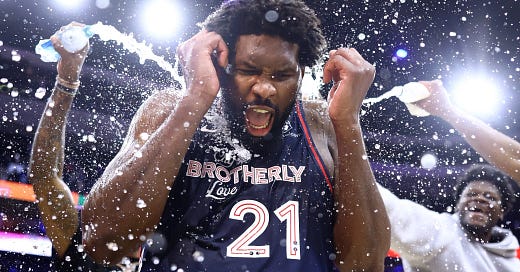Is Joel Embiid the Greatest Scorer in NBA History?
It sounds like hyperbole, but after his 70-point performance on Monday, the defending MVP actually has a statistical case.
Just when you think Joel Embiid’s scoring exploits can’t get any more extraordinary, he raises the bar to an entirely new level.
Embiid was already in the middle of a stretch with 21 consecutive games of 30 or more points, which is the fifth-longest such streak in NBA history — but merely extending that run wasn’t enough on Monday. Playing against Victor Wembanyama and the San Antonio Spurs, Embiid dropped 70 points (plus 18 rebounds and five assists) to set a new Philadelphia 76ers franchise record for scoring in a single game, topping Wilt Chamberlain’s mark of 68 points from Dec. 16, 1967.
Embiid currently leads the league in scoring with 36.1 points per game, which would be a career-high and carry him to a third straight NBA scoring crown. It’s hard to argue anyone else in the league right now is better at putting the ball in the basket than the Sixers’ superstar. But that’s probably understating how great of a scorer Embiid is. While it sounds hyperbolic, there is a good statistical case to be made that Embiid is actually the greatest scorer in NBA history.
With a career average of 27.9 PPG, Embiid currently sits fourth on the all-time points per game leaderboard, trailing Michael Jordan (30.1), Chamberlain (30.1) and a fellow active player, Luka Dončić (28.2). But those players did their damage in more minutes per game than Embiid, who has played just 32.0 MPG in his career. This is why Embiid is actually by far the league’s all-time leader in points per 36 minutes, among players with a minimum of 10,000 career minutes played.
But as savvy hoops observers know, other forces can influence a player’s scoring output as well. One of the biggest of those factors is pace, or the number of possessions per game that a team plays. Uptempo teams (or teams from comparatively uptempo eras) will feature more possessions in their games, giving players more chances to produce big numbers. The NBA is currently in a higher-pace era than at any time since the 1980s, but the league’s average possessions per game (99.2) are still far fewer than in, say, 1961-62 — when there were a remarkable 126.2 possessions per game as Chamberlain was averaging 50.4 a night.
We can adjust for this by pro-rating every player’s scoring average to its equivalent per 100 possessions that he was on the court for. With 42.4 points per 100 possessions played, Embiid is also the all-time career leader in this category as well, beating out Jordan’s 40.3 mark:
There are still other considerations that add even more nuance to the GOAT-scorer discussion. For instance, Ben Taylor of Thinking Basketball is fond of setting a player’s scoring within the context of their shooting efficiency, as well as how strong their offenses tended to be, relative to league norms. If we do this for every player who has a career average of at least 35 points per 100 possessions, it paints a more complicated picture of where Embiid stands in the pantheon of great scorers:
If there was a Mount Rushmore of high scorers who also shot efficiently and led hyper-efficient offenses, it would include Shaquille O’Neal, James Harden, Steph Curry and Kevin Durant. Embiid’s scoring efficiency is lower, and sits closer to that of LeBron James, while he has also led less effective offensive teams than others such as Jordan and Kobe Bryant. However, Embiid does have a better True Shooting % (relative to league average) than James, Jordan or Bryant, and is well beyond Dončić in that regard as well.
(If you’re wondering about Chamberlain, he “only” averaged 25.7 points per 100 possessions in his career, so he didn’t make our chart above. And while he had a sky-high TS% index of 112.7, his offenses were only +0.3 points of rating above league average in his career. Wilt has always had an extremely complex and confusing statistical legacy, which Taylor does a great job of exploring here.)
If one were so inclined, they could also dig even deeper into matters such as supporting casts (Embiid has been paired with a pretty varied group of stars, but none for very long), performance in the crucible of the playoffs (Embiid’s scoring rates and efficiency tend to fall in the postseason), or even the biggest knock on Embiid’s GOAT-scorer case: Durability.
Unlike some of his peers on the lists above, Embiid has played only 47.2% of available minutes for the Sixers since making his debut in 2016-17. (That number would be even lower if we accounted for the fact that he sat the entirety of the first two seasons after he was drafted.) Chamberlain, by contrast, was averaging 47.0 minutes per game while missing only 11 total games through the same age. Surely those kinds of disparities should count for something, fans of other stars would contend.
But still, in terms of pure scoring volume when he is on the floor, it is a statistical fact that Embiid is the most prolific scorer in the history of the NBA. And if we weren’t already aware of that fact, Embiid’s 70-point explosion served as a Big Dipper-sized reminder of just how incredible he can be.
Filed under: NBA





